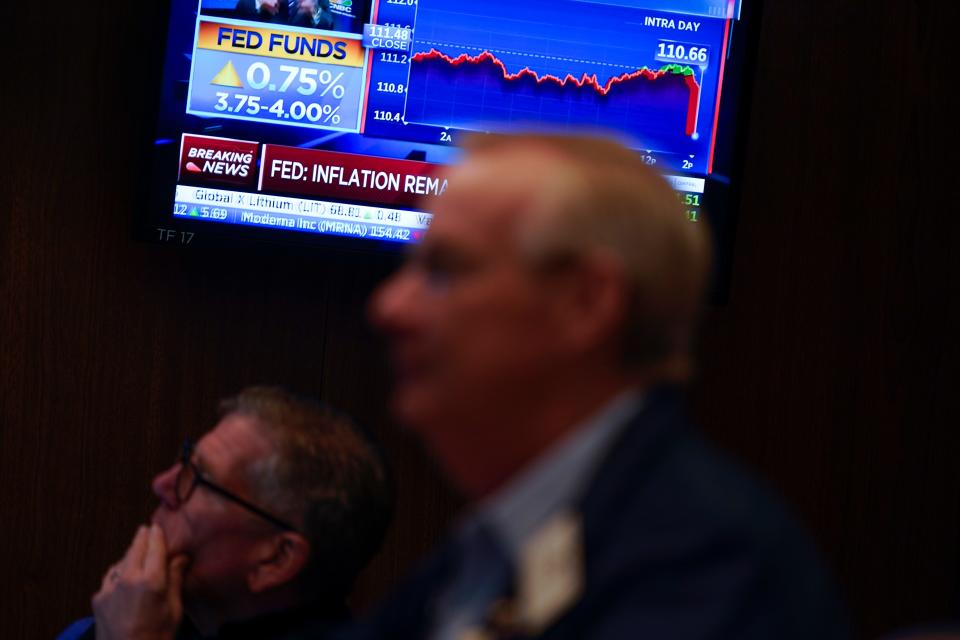When should you sell stock? The dos and don'ts of a stock market sell-off

When the going gets tough in the stock market, even some of the toughest investors cover their eyes. Conventional investing wisdom holds that you should never make emotional investment decisions. That’s especially true on days when markets are cratering and investors’ inclination is to cut their losses.
Research shows that you’re much better off doing nothing than panic selling, but is it wrong to go bargain hunting when stocks are selling off?
“When you're feeling fear and panic is probably when you should be thinking about investing,” said Brad Roth, chief investment officer at Thor Financial Technologies. As opposed to when you “feel the coast is clear” because oftentimes, that can be masking the volatility that could be on its way, he said.
How to buy stocks: A basic introduction to the market for first-time investors
What is a sell-off?
According to The Associated Press, a sell-off is the rapid selling of securities such as stocks, bonds, or commodities. A sell-off can occur in an individual security – a company's stock, the 10-year Treasury note, crude oil futures – or in a broader market. A minor sell-off is called a pullback.
Have a plan
Putting more money into markets when uncertainty about the future outlook is at its height is no easy feat.
It’s understandable if you weren’t jumping at the opportunity to buy stocks on March 16, 2020, when the Dow Jones Industrial Average plunged by nearly 13%, the biggest single-day drop the index ever experienced. At the same time, if you exited the market that day you would have missed out on the tremendous rally that carried over into the start of this year.
That’s why it’s important to make a game plan before stocks experience big sell-offs, said Kristina Hooper, chief global market strategist at Invesco.

Start by thinking about what you would want to buy if the stock market went down by 10% in a given period. If you’re having trouble picking stocks, think about what you could add to your portfolio to increase your exposure to different sectors of the market you aren’t already invested in. Hooper recommends researching exchange-traded funds and mutual funds that concentrate on the sectors you identify your portfolio is lacking.
Importantly, don’t put together this plan on a day when markets are rallying or selling off because it could skew your choices. “It’s far better to kind of come up with a plan in an emotionless vacuum and then deploy it regardless of emotions as market conditions unfold,” she said.
Use dollar-cost averaging
Another tactic investment advisers recommend is dollar-cost averaging. Dollar-cost averaging is similar to employees electing to have a certain amount of their paycheck go to their 401(k) and automatically invested in, for instance, a target-date retirement fund.
With dollar-cost averaging, you commit the same amount of money on a regular basis toward buying an asset regardless of the price it’s trading at. When it’s trading at a lower price, you’ll end up buying more shares as opposed to when it’s trading at a higher price. Hence, following this strategy can reduce the average cost you end up paying per share over time as opposed to if you were trying to time the market.
This should also help alleviate some of the anxiety that arises when stocks are plunging, said Roth.

ETFs vs mutual funds: What's the difference? How to choose which to buy.
Investing: Here are the stocks to buy as the market falls and inflation rises
Try to maintain a long-term investment horizon
If you’re nearing retirement or you’ve already retired, you’re much more vulnerable to stock market volatility than people who have a longer-term investment horizon.
But if you don’t have an immediate need for the money you’ve invested, “the best course of action is to remain in it for the long term,” Hooper said. Why? Because over time all the big swings up and down investors see in the market smooth out. Look at any major index for proof. Spoiler alert: they all go up.
If you have a long-term time horizon of at least 10 years, “there’s no reason to even consider panicking during market downturns,” said Roth.
The Associated Press contributed to this report.
Elisabeth Buchwald is a personal finance and markets correspondent for USA TODAY. You can follow her on Twitter @BuchElisabeth and sign up for our Daily Money newsletter here
This article originally appeared on USA TODAY: Should you sell your stocks in a sell-off? Market advice from experts

 money
money 